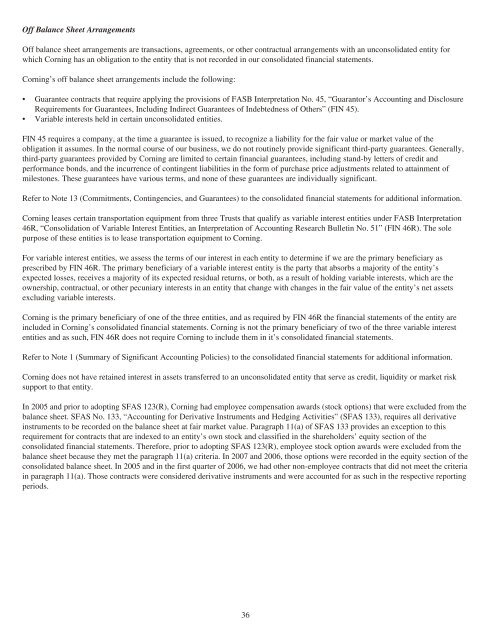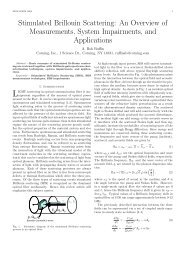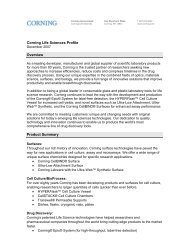You also want an ePaper? Increase the reach of your titles
YUMPU automatically turns print PDFs into web optimized ePapers that Google loves.
Off Balance Sheet Arrangements<br />
Off balance sheet arrangements are transactions, agreements, or other contractual arrangements with an unconsolidated entity for<br />
which <strong>Corning</strong> has an obligation to the entity that is not recorded in our consolidated financial statements.<br />
<strong>Corning</strong>’s off balance sheet arrangements include the following:<br />
• Guarantee contracts that require applying the provisions of FASB Interpretation No. 45, “Guarantor’s Accounting and Disclosure<br />
Requirements for Guarantees, Including Indirect Guarantees of Indebtedness of Others” (FIN 45).<br />
• Variable interests held in certain unconsolidated entities.<br />
FIN 45 requires a company, at the time a guarantee is issued, to recognize a liability for the fair value or market value of the<br />
obligation it assumes. In the normal course of our business, we do not routinely provide significant third-party guarantees. Generally,<br />
third-party guarantees provided by <strong>Corning</strong> are limited to certain financial guarantees, including stand-by letters of credit and<br />
performance bonds, and the incurrence of contingent liabilities in the form of purchase price adjustments related to attainment of<br />
milestones. These guarantees have various terms, and none of these guarantees are individually significant.<br />
Refer to Note 13 (Commitments, Contingencies, and Guarantees) to the consolidated financial statements for additional information.<br />
<strong>Corning</strong> leases certain transportation equipment from three Trusts that qualify as variable interest entities under FASB Interpretation<br />
46R, “Consolidation of Variable Interest Entities, an Interpretation of Accounting Research Bulletin No. 51” (FIN 46R). The sole<br />
purpose of these entities is to lease transportation equipment to <strong>Corning</strong>.<br />
For variable interest entities, we assess the terms of our interest in each entity to determine if we are the primary beneficiary as<br />
prescribed by FIN 46R. The primary beneficiary of a variable interest entity is the party that absorbs a majority of the entity’s<br />
expected losses, receives a majority of its expected residual returns, or both, as a result of holding variable interests, which are the<br />
ownership, contractual, or other pecuniary interests in an entity that change with changes in the fair value of the entity’s net assets<br />
excluding variable interests.<br />
<strong>Corning</strong> is the primary beneficiary of one of the three entities, and as required by FIN 46R the financial statements of the entity are<br />
included in <strong>Corning</strong>’s consolidated financial statements. <strong>Corning</strong> is not the primary beneficiary of two of the three variable interest<br />
entities and as such, FIN 46R does not require <strong>Corning</strong> to include them in it’s consolidated financial statements.<br />
Refer to Note 1 (Summary of Significant Accounting Policies) to the consolidated financial statements for additional information.<br />
<strong>Corning</strong> does not have retained interest in assets transferred to an unconsolidated entity that serve as credit, liquidity or market risk<br />
support to that entity.<br />
In 2005 and prior to adopting SFAS 123(R), <strong>Corning</strong> had employee compensation awards (stock options) that were excluded from the<br />
balance sheet. SFAS No. 133, “Accounting for Derivative Instruments and Hedging Activities” (SFAS 133), requires all derivative<br />
instruments to be recorded on the balance sheet at fair market value. Paragraph 11(a) of SFAS 133 provides an exception to this<br />
requirement for contracts that are indexed to an entity’s own stock and classified in the shareholders’ equity section of the<br />
consolidated financial statements. Therefore, prior to adopting SFAS 123(R), employee stock option awards were excluded from the<br />
balance sheet because they met the paragraph 11(a) criteria. In <strong>2007</strong> and 2006, those options were recorded in the equity section of the<br />
consolidated balance sheet. In 2005 and in the first quarter of 2006, we had other non-employee contracts that did not meet the criteria<br />
in paragraph 11(a). Those contracts were considered derivative instruments and were accounted for as such in the respective reporting<br />
periods.<br />
36







